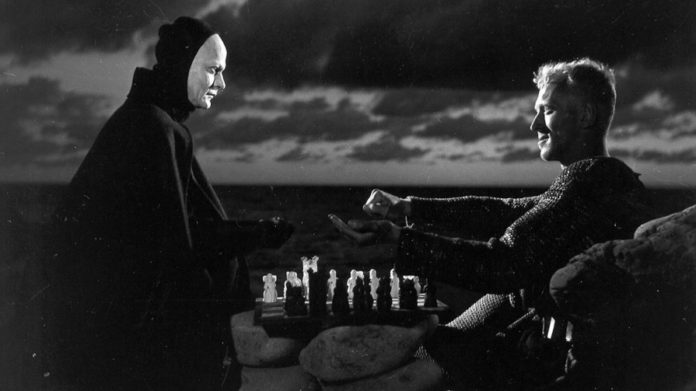A post on Industrial Scripts examines existentialism and how to write an existentialist novel or film script. This philosophical approach isn’t easy to define, but it can be a powerful way to examine life, death, and our purpose. Existentialism examines the individual in the context of an unfathomable universe and how the individual can assume responsibility for acts of free with when there is no certain knowledge of right or wrong. In other words, the existentialist hero searches for meaning in life in a world that seems devoid of it.
The key components of existentialism are feelings of alienation from other people and our surroundings; a sense of angst about our place and purpose in the world; and an awareness of the inevitable flow of time and the end of ourselves and eventually, humanity.
The article examines four existentialist films to see how this point of view can be used in story, including Akira Kurosawa’s To Live, Ingmar Bergman’s The Seventh Seal, Peter Weir’s The Truman Show, and Sofia Coppola’s Lost in Translation.
Of course, it’s not going to be easy to compete with those films. However, the article identifies four key building blocks:
- Focus on the individual. Choose your protagonist and use him or her to explore what it means to be human. Lean into their internal conflict. “The meaning of life, according to existentialists, is an intimate and personal quest that we must all venture on,” the article says.
- Examine the psyche. Use the concepts of alienation, despair, and angst to create an existential crisis for your protagonist.
- Seek a breakthrough moment. While your character may be driven by dread, he should also have a desire to break free from his constraints. In other words, he must have faith that life has meaning. “Ultimately, in order for your screenplay to reach a judgment on the meaning of life, your characters must seek it out,” the article explains. “This will be the film’s arc; the attempt to break free of whatever constraint is on them.”
- Create change. The four films listed above each conclude that the meaning of existence is a persona choice. Only the protagonist can find the film’s denouement, because it is a personal choice. “So as much as your story will be about your protagonist pondering their existence, it’s important to have an idea of where they land at the end of this journey before you start writing,” the article says. “Do they have a newfound appreciation of life? Or are they finally asserting control over their life? Either way, your character’s journey must have purpose and a concrete, tangible end destination.”












